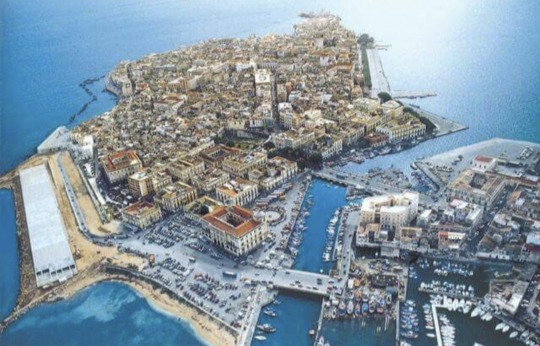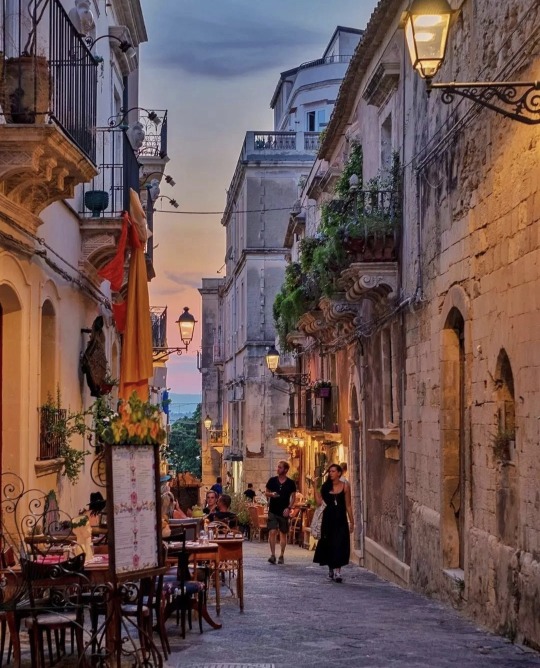#ortygia
Text
Artemis - World History Encyclopedia
https://www.worldhistory.org/artemis/
View On WordPress
#Apollo#Arcadians#Arcas#Artemis#Bows#Callisto#Cult#Cyclops#Delos#Ephesus#Greek#Leto#Museums#Niobe#Orion#Ortygia#Pan#Temple of Artemis#Turkey#Twins#Vatican#Zeus
0 notes
Text
lots of people going on the vento aureo tour but i want to go on the purple haze feedback tour
2 notes
·
View notes
Text
La Musica e Vita
Quimbara by Celia Cruz & Johnny Pacheco https://www.shazam.com/track/5441476/quimbara?referrer=share
View On WordPress
#African Diaspora#African Pantheon#Aprende Castellano#Celia Cruz#Csquared#I heart NY#Jean Paul#John Paul#Johnny Pacheco#JP#Juan Pablo#Juan Pablo Knipping Pacheco#la Musica e Vita#la raza#la vita e Bella#NY#nyc#Orishas#Ortygia)#Pacheco#Pan African#Pan American#salsa#SPQR#St. John the Divine#St. Paul (Saul of Tarsus; on the Road to Damascus#Syracuse#Turkey
0 notes
Text

We're so used to referring to Apollo and Artemis as Divine Twins, but did you know that the earliest known Ancient Greek sources do not explicitly denote the two as being twins?
That isn't to say one text depicting a myth is more correct than the other - but I so rarely see mentions of Apollo and Artemis as not twins that I find it all the more dear.
There is beauty in Solar and Lunar twins - but I also see the same beauty in siblings who are not predetermined to be each other's mirror by the fact of birth.
The first mention of Apollo's name in the Ancient Greek texts is in the Homeric Hymn to Apollo (3), trans. by Hugh G. Evelyn-White:

Here's a link to the original.
They are not explicitly called twins and They have different birthplaces: Apollo's birthplace is Delos, Cyclades - Artemis is born in a place named Ortygia. It should be stated that only Apollo's birth is given any sort of detail, and it is unclear where Ortygia was.
Ortygia (center of modern Syracuse named after the Greek word for quail) in Sicily has been known to Greek colonizers since around the 8th century BCE, Homeric Hymns date to approximately the 7th-6th century BCE. It's possible that Artemis was born there. In this case, the locations are separated by the Ionian sea and a large part of Greece. Delos is a small island to the North from Naxos and right at the Southern ridge of Mykonos, Ortygia in Italy is the Eastern part of Sicily:
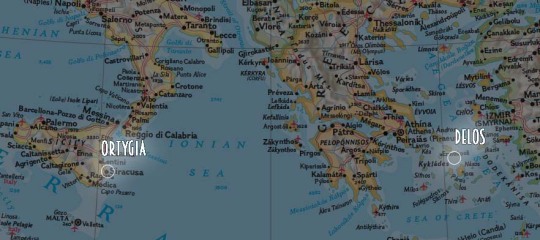
Ortygia could also be attributed to a large number of other places. Strabo (63 BCE - 24 AD) in his Geography (10.5.5) stated that Ortygia is but an old name for Delos or for Rheneia, a small island in the Cyclades:
Rheneia is a desert isle within four stadia from Delos, and there the Delians bury their dead; for it is unlawful to bury, or even burn, a corpse in Delos itself, and it is unlawful even to keep a dog there. In earlier times it was called Ortygia.
Though earlier in the same book (6.2.4) he argues that Ortygia might also be in Sicily. He gives a detailed explanation of what we now know as the Old Town of Syracuse:
Ortygia is connected with the mainland, near which it lies, by a bridge, and has the fountain of Arethusa, which sends forth a river that empties immediately into the sea.
— The Geography of Strabo, Books 1-5 translated by Hamilton and Falconer
Ortygia is also a placename attested to different parts of Greece. For example, in Homer's Odyssey (5.123), a much earlier text, Artemis kills Orion in Ortygia and the place is not anyhow noted to be connected to Delos:
<...> until in Ortygia chaste golden-throned Artemis
attacked with her painless darts and killed him.
— The Odyssey of Homer, translated by James E. Huddleston
Hymn to Apollo is not the only Ancient text predating any mention of "twins" that did not specify that the two were born at the same time. Hymn to Artemis (27) calls the Gods a brother and a sister while Hymn to Artemis (9) indicates that They were raised together (ὁμότροφον) without a notion of the circumstances of Their birth. Those are the earliest sources we know of, but there were many other authors and traditions that followed, some of which were:
Homer in the Iliad makes Them a son and a daughter of Leto
Hesiod mentions them being born from the same mother
Neither describe the two as twins.
Apollodorus in his Bibliotheca (1.4.1.) makes Artemis be a first-born so She serves as a midwife for Apollo
Plutarch in Pelopidas states that Apollo was born in Tegyra, Boeotia
Some later sources (Callimachus, Servius) consider Artemis to be first-born while some (Hyginius) do not specify on time of birth.
The first - and most prominent - author to speak of the Divine Twins is Pindar (518-438 BCE) in his Olympian odes (3.35), here he refers to Them as twins of Leda. At the same time, in the Nemean odes (1.1) he calls Ortygia in Sicily Artemis' birthplace and "sister to Delos" (might be metaphorical, as in sister-state). Orphic Hymn 35 to Leto (1st-3rd AD?) also calls Them twins.
It should probably also be noted that the cult of Artemis and the cult of Apollo are not always interconnected. While some locations (such as Delos and Ortygia, Sicily) have a history of implementing both Deities into the same votive tradition, some (Didyma, Claros) have worship of the Gods completely disconnected from each other. It is likely worth another post, but worship of Apollo didn't necessarily imply His sister, and vice versa.
With all of this being said, I do not believe that one version of the story is above another. And while I do find it fascinating - and logical - that the idea of Apollo and Artemis being twin-Deities has taken root, I do appreciate other, older and not, versions of the same legend.
#HISTORIA 📔#I have an insane aesthetic rule with golden text but. I hope you can see underlined text; those are all links.#greek mythology#greek gods#artemis#apollo#artemis deity
98 notes
·
View notes
Note
I have heard that Apollo and Artemis being twins was a relatively later development, so have you come across any versions where they are not twins? Another question I have, is Artemis being the eldest twin have evidence?
In the older versions, it's very likely that Artemis and Apollo were born separately , either at different times or different places, or both. But in a lot of later sources, they are stated to be twins. And yes, there are accounts where Artemis was born first and helped Leto give birth to Apollo. But I will also talk about why I think Artemis might be the younger sibling in Callimachus' works.
So these are the authors who make it very clear that Apollo and Artemis are twins: Pindar, (Pseudo) Apollodorus, Strabo, (Pseudo) Hyginus, Ovid, Servius, Antoninus, Nonnus. Servius and Apollodorus also say that Artemis was born first. Except for Pindar, the others are from a relatively later time period. Half of them are Roman authors.
Let's take a look at some of the older sources:
According to Hesoid, the 7th day of the month is sacred because that's the day on which Leto gave birth to Apollo, but he does not mention the birth of Artemis or that day being dedicated to her.
The Homeric hymn to Delian Apollo, which describes in great detail the troubles Leto went through to birth Apollo, never mentions anything about Artemis' birth. Eiliethyia is the one who helps Leto during childbirth, so we can assume Artemis was not in the picture at all. In another Homeric hymn to Apollo, it's explicitly stated that they both were born in different places:
"Rejoice, blessed Leto, for you bare glorious children, the lord Apollo and Artemis who delights in arrows; her in Ortygia, and him in rocky Delos, as you rested against the great mass of the Cynthian hill hard by a palm-tree by the streams of Inopus" (trans. Evelyn-White)
Now some later authors do mention that both are names of the same place. Ortygia was renamed Delos after the birth of Apollo. There are also sources that clearly state Artemis was born on Delos. But in this hymn at least it seems clear to me that they are presented as different places and the twins (?) were born separately.
Theognis also, mentions only Apollo being born on Delos.
Coming to another hymn that gives a detailed narration of Apollo's birth - the Hymn to Delos by Callimachus. Callimachus' works are dated later than Pindar's, but he also goes with Leto giving birth only to Apollo on Delos. Again Artemis is not mentioned anywhere in the very long hymn. Adding to that, in the hymn to Artemis, he says that Artemis was born without causing any pain to Leto, which is why Fates ordained her to ease women's birth pangs. So if Artemis was indeed born along with Apollo, I don't see why that detail would be omitted from the hymn to Delos.
Now here onwards starts my "hear me out" thoughts: In the Callimachus' hymn to Artemis, Apollo seems to already have enough renown. She asks Zeus to grant her some gifts, and one of them is that she must have as many titles as Apollo does:
"when sitting on her father’s knees – still a little maid – she spake these words to her sire: “Give me to keep my maidenhood, Father, forever: and give me to be of many names, that Phoebus may not vie with me." (trans. Mair)
When she is three years old, Leto takes her to the Cyclopes to get her bow and arrows:
"Therefore right boldly didst thou address them then: “Cyclopes, for me too fashion ye a Cydonian bow and arrows and a hollow casket for my shafts; for I also am a child of Leto, even as Apollo." (trans. Mair)
This implies that the Cyclopes had already given a set of bow and arrows to Apollo, and Artemis is asking them to do the same for her. ALSO adding to that, in Callimachus' hymn to Apollo, he says that 4 year old Apollo built an altar made out of horns of the goats that Artemis hunted. So if Artemis started hunting at 3, and Apollo built that altar at 4 - maybe they're like a year apart.
(Most of the sources that I have mentioned can be found here.)
Personally though, I prefer them being born as twins. But the concept of then being born separately is very intriguing to me. I'm gonna end this with vase paintings that support both the ideas, because why not?
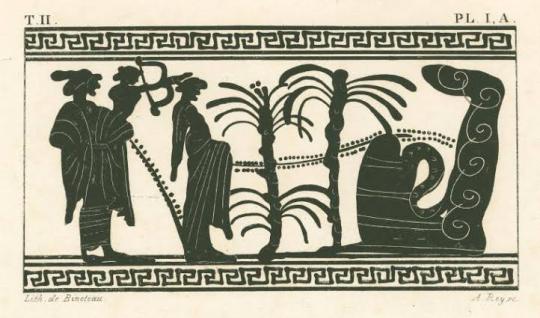
Leto, Apollo and Artemis - with Apollo shooting at Python from his mother's arms.

Leto and her twins fleeing from Python
25 notes
·
View notes
Text
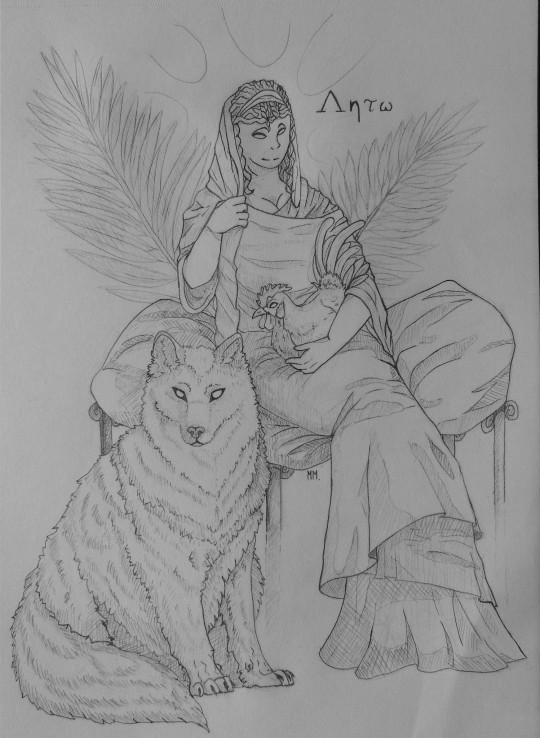
Leto - Divine Mother of Twins
Dark-veiled Leto, revered goddess,
mother of twins,
great-souled daughter of Koios,
queen to whom many pray,
to your lot fell the birth pains
for Zeus’ fair children,
you bore Phoibos
and arrow-pouring Artemis,
her on Ortygia,
him on rocky Delos.
Hear, lady goddess,
come with favor in your heart
to bring a sweet end
to this all-holy rite.
Orphic Hymn - To Leto
#leto#queen leto#leto deity#leto worship#leto devotee#leto art#divine mother#helpol#hellenic polytheism#hellenic pagan#hellenic polythiest#greek gods#greek mythology#hellenic revivalism#hellenic revivalist#hellenic polytheist#hellenic paganism#hellenic polytheistic#hellenic pantheon#art#artist on tumblr#morsel:helpol#morsel:orig#morsel:art#wolf art#wolf#gods#greek myth#greek goddess#morsel:art_c.Gods
100 notes
·
View notes
Note
[206] And Semele in Olympos, with a breath of the thunderbolts still about her, lifted a proud neck and cried with haughty voice - "Hera, you are ruined! Semele's son has beaten you! Zeus brought forth my son, he was the mother in my place! The father begot, the father brought forth his begotten. He brought forth a child from a makeshift womb of his own, and forced nature to change.
Bacchos was stronger than Enyalios; your Ares he only begot, and never childed with his thigh! Thebes ahs eclipsed the glory of Ortygia!12 For Leto the divine was chased about, and brought forth Apollo on the sly; Leto brought forth Pholbos, Cronion had no labour for him;
Maia brought forth Hermes, her husband did not deliver him; but my son was brought forth openly by his father.
Here's a great miracle! See Dionysos in the arms of your own mother, he lies on that cherishing arm! The Dispenser of the eternal universe, the first sown Beginning of the gods, the Allmother, became a nurse for Bromios; she offered to infant Bacchos the breast which Zeus High and Mighty has sucked! What Cronides was ever in labour, what Rheia was ever nurse for your boy? But this Cybele who is called your mother brought forth Zeus and suckled Bacchos in the same lap! She dandled them both, the son and the father. No fatherless Hephaistos could rival Semele's child, none unbegotten of a father whom Hera brought forth by her own begettomg - and now he limps about on an illmatched pair of feeble legs to hid his mother's bungling skill in childbirth! Maia was not quite like Semele; for her son, crafty, armed himself like Ares, and looking like him, deluded Hera until he sucked the milk of her breast.13 Give place to me all! for Semele alone had a husband, who got and groaned for the same child. Semele is happiest, because of her son: for my Dionysos will come without scheming into the company of the stars; he will dwell in his father's heaven, because he drew milk from the godnursing teat of that mighty goddess. He will come selfsummoned into the hei v he needs not Hera's milk, for he has milked a noble, breast."
[243] She spoke exulting even in the sky; but the angry consort of Zeus fell heavily in surprise upon the house of Athamas and scared Ino into flight. She still resented the childhood of Dionysos.
Nonnus, Dionysiaca
If I was Hera I would’ve teamed up with Leto and Maia and beat Semele’s ass.
Also the point about Ares must especially sting bc Rhea also sent Ares a nightmare that Aphrodite left him, but what she said about Hephaestus pisses me off especially not only is she being an ableist cunt Hephaestus did nothing but support Dionysus (even letting his sons help him) and yet Semele has the audacity to speak about him this way? Fuck Semele, all my homies hate Semele.
Hephaestus probably:
youtube
#I prefer the version where Semele stays dead and doesn’t become immortal and live on Olympus#also Leto was ableist about Hephaestus in Lucian’s Dialogues#but at least she had the decency to only be passive aggressive rather than straight up boast about it#greek mythology#ancient greek mythology#greek pantheon#greek goddess#hera#hera goddess#hera deity#hera greek mythology#zeus#hephaestus#hephaestion#hephaistos#Dionysus#dionysos#Dionysiaca#Semele#zeus greek mythology#Rhea#cybele
15 notes
·
View notes
Text
On the Augustan Temple of Apollo on the Palatine
Propertius II.31
You ask why I’ve come to you late? The golden portico
Of Phoebus had been opened by great Caesar.
So great a sight it was divided into by Punic columns –
Among them, the daughter-crowd of old Danaus.
Here marble Phoebus seemed to gape in song to the silent lyre
(More handsome, it seemed to me, than the god himself);
Around the altar stood a herd of Myron’s: four
Crafted cows, statues that looked alive.
Then the temple (shining marble) rose in the middle,
Even dearer to Phoebus than Ortygia his homeland:
On which, atop the roof-pole, was the chariot of the Sun,
And doors, a noble work of Libyan ivory –
The one mourned Gauls cast down from Parnassus’ peak,
The other, the deaths of Tantalus’s daughter.
Last, the Pythian god, between his mother and sister,
In a long garment, rings out with song.
Quaeris, cur veniam tibi tardior? aurea Phoebi
porticus a magno Caesare aperta fuit.
tantam erat in speciem Poenis digesta columnis,
inter quas Danai femina turba senis.
hic equidem Phoebus visus mihi pulchrior ipso
marmoreus tacita carmen hiare lyra;
atque aram circum steterant armenta Myronis,
quattuor artifices, vivida signa, boves.
tum medium claro surgebat marmore templum,
et patria Phoebo carius Ortygia:
in quo Solis erat supra fastigia currus;
et valvae, Libyci nobile dentis opus,
altera deiectos Parnasi vertice Gallos,
altera maerebat funera Tantalidos.
deinde inter matrem deus ipse interque sororem
Pythius in longa carmina veste sonat.
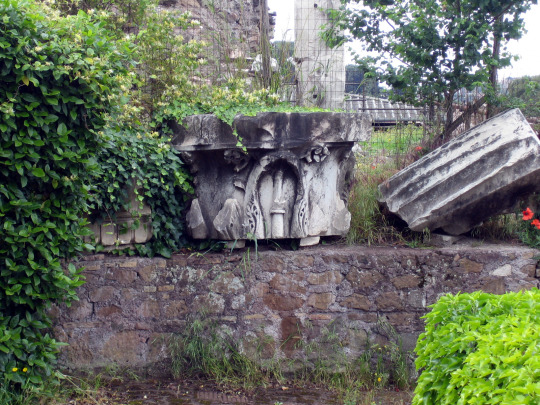
The remains of Apollo's temple on the Palatine Hill, Rome. Photo credit: Antmoose/Wikimedia Commons.
#classics#tagamemnon#Latin#latin language#lingua latina#langblr#translation#Latin translation#poem#poetry#poetry in translation#Ancient Rome#Roman Empire#Propertius#Roman religion#Ancient Roman religion#religio Romana#Apollo#Apollo Palatinus#elegiac couplets
70 notes
·
View notes
Text

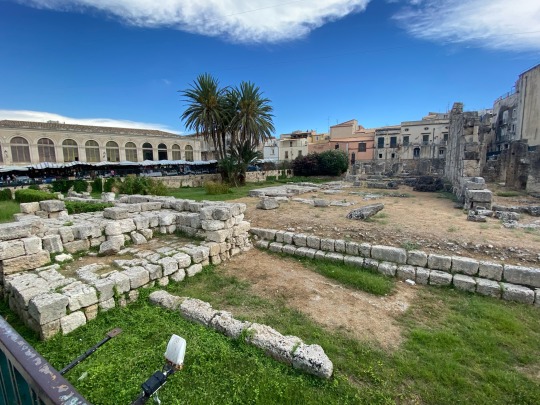
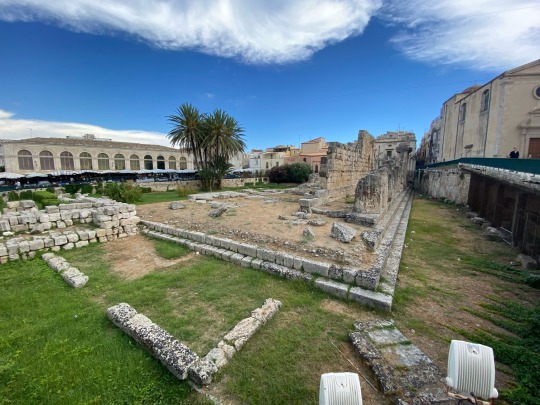
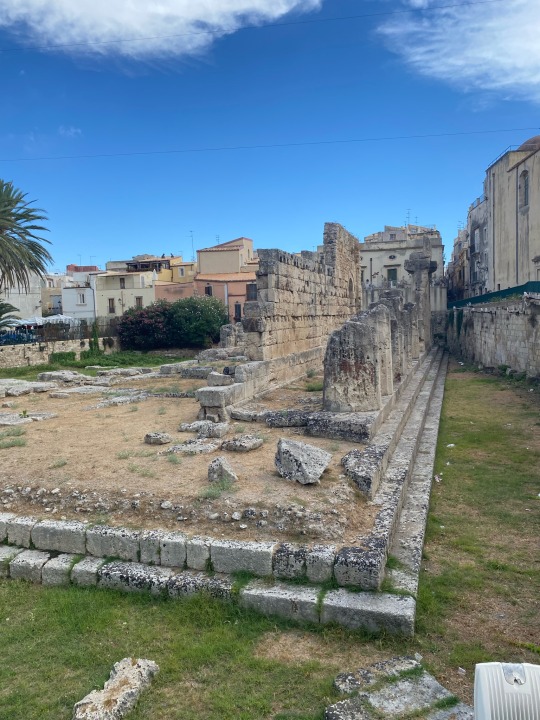
the isle of Ortygia and the temple to her patron god 🌞 pics i took today
#hellenic polytheism#hellenism#the old gods#hellenic reconstructionism#art history#hellenic paganism#hellenic pagan#greek gods#hellenic gods#helpol#greek mythology#hellenic religion#hellenic polythiest#apollo deity#apollon worship#apollon devotee#apollon#apollo god
169 notes
·
View notes
Text

Madame Yevonde :: Lady Bridget Poulett as 'Arethusa'. Vivex colour print, 1935 | NPG
Given by Madame Yevonde (Yevonde Philone Middleton (née Cumbers)), 1971
view on wordPress
Arethusa was a wood nymph from Elis, associated with the goddess Artemis. Pursued relentlessly by the river-god Alpheus, Arethusa begged for Artemis's help in escaping his attentions. The goddess opened up a passage under the sea which enabled Arethusa to emerge as a spring in Syracuse, on the island of Ortygia (Sicily) - hence the seaweed in Yevonde's sitter's hair. (quoted from src)
#1930s#arethusa#bridget poulett#color photography#hairdo#Madame Yevonde#npg#portrait#Porträt#retrato#ritratto#portret#retrat#Bildnis#role portrait#yevonde cumbers middleton
179 notes
·
View notes
Note
[206] And Semele in Olympos, with a breath of the thunderbolts still about her, lifted a proud neck and cried with haughty voice - "Hera, you are ruined! Semele's son has beaten you! Zeus brought forth my son, he was the mother in my place! The father begot, the father brought forth his begotten. He brought forth a child from a makeshift womb of his own, and forced nature to change.
Bacchos was stronger than Enyalios; your Ares he only begot, and never childed with his thigh! Thebes ahs eclipsed the glory of Ortygia!12 For Leto the divine was chased about, and brought forth Apollo on the sly; Leto brought forth Pholbos, Cronion had no labour for him;
Maia brought forth Hermes, her husband did not deliver him; but my son was brought forth openly by his father.
Here's a great miracle! See Dionysos in the arms of your own mother, he lies on that cherishing arm! The Dispenser of the eternal universe, the first sown Beginning of the gods, the Allmother, became a nurse for Bromios; she offered to infant Bacchos the breast which Zeus High and Mighty has sucked! What Cronides was ever in labour, what Rheia was ever nurse for your boy? But this Cybele who is called your mother brought forth Zeus and suckled Bacchos in the same lap! She dandled them both, the son and the father. No fatherless Hephaistos could rival Semele's child, none unbegotten of a father whom Hera brought forth by her own begettomg - and now he limps about on an illmatched pair of feeble legs to hid his mother's bungling skill in childbirth! Maia was not quite like Semele; for her son, crafty, armed himself like Ares, and looking like him, deluded Hera until he sucked the milk of her breast.13 Give place to me all! for Semele alone had a husband, who got and groaned for the same child. Semele is happiest, because of her son: for my Dionysos will come without scheming into the company of the stars; he will dwell in his father's heaven, because he drew milk from the godnursing teat of that mighty goddess. He will come selfsummoned into the hei v he needs not Hera's milk, for he has milked a noble, breast."
[243] She spoke exulting even in the sky; but the angry consort of Zeus fell heavily in surprise upon the house of Athamas and scared Ino into flight. She still resented the childhood of Dionysos.
Nonnus, Dionysiaca
Semele: I got incinerated before I could carry my baby to term so his father had to finish what I wasn't able to. That makes me superior to other mothers somehow and my son superior to other gods because he was born from a male's body, not from a lesser female womb like everyone else.
I do wish she was right about Dionysos not needing to suckle at Hera's breast in order to ascend to heaven, I really do, but unfortunately that is not the case and we have this horrifying scene in Book 35:
"But how kind you would be to your Cronion, if you will only drive that distracting madness from tormented Dionysos! Do not fail your provoked husband; but go uncaught to the fertile slope of the woodland pastures of India, and offer your breast to Bacchos as once did my mother Rheia; let him draw with his lips older grown your holy drops, and by that draught lead him on the way to Olympos and make heaven lawful ground for the feet of earthborn Dionysos!
Anoint with your milk the body of Lyaios, and cleanse the ugly stains of mind-robbing disease. And I offer you a worthy reward; for I will place in Olympos a circle, image of that flow named after Hera's milk, to honour the allfamous sap of your saviour breast. Only I pray you beware of the menace of Zeus, and stretch again no other net of deceit for Dionysos his beloved son."" So saying, he dismissed his resentful consort Hera, to heal the trouble of Bacchos against her will, to be gracious and friendly towards afflicted Dionysos, that her hands might salve the body of Bromios with the milky dew from her godnursing breasts.
Hera did not disobey. She anointed the body of Lyaios with the divine drops of her painhealing teat, and wiped away the stains of the wild divine frenzy. When she saw the manhood and radiance of Dionysos and touched mad Bacchos with grudging hands, she felt a double jealousy although her face hid it. She opened her dress on both sides for his lips, and bared her teats full of ambrosia, pressing the jealous breast to let the milk flow, and brought him back to life."
I just vomited a little in my soul.
5 notes
·
View notes
Text
Siracusa
Siracusa (or Syracuse) was the most important city of Magna Graecia. In 413 BC, it defeated Athens. At the height of its power, it was a city of over 300,000. Cicero called it “the greatest Greek city and the most beautiful of them all. “
He had the beautiful part right. Today we took the one hour train ride from Catania to Siracusa. It was a beautiful place to visit on a beautiful day.
There are two distinct parts of the city. Ortygia is a small island, connected by bridges, which is the heart of the old city. The archeological park is in the northern part of the city. We visited both and neither disappointed.
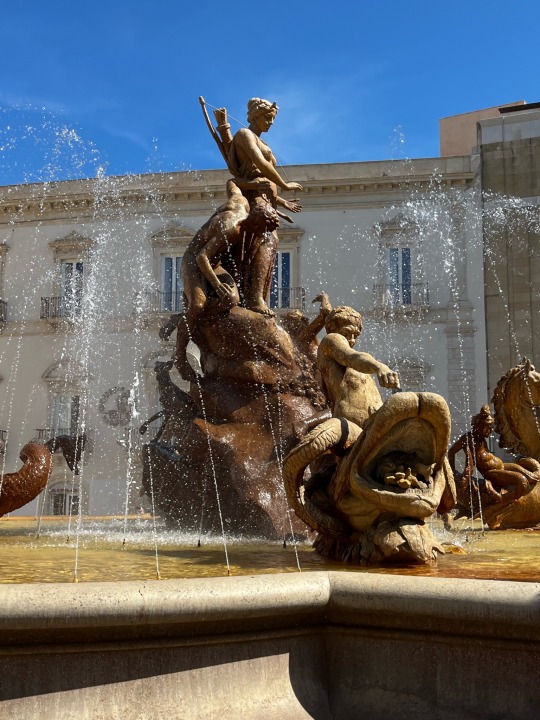
The Fountain of Diana
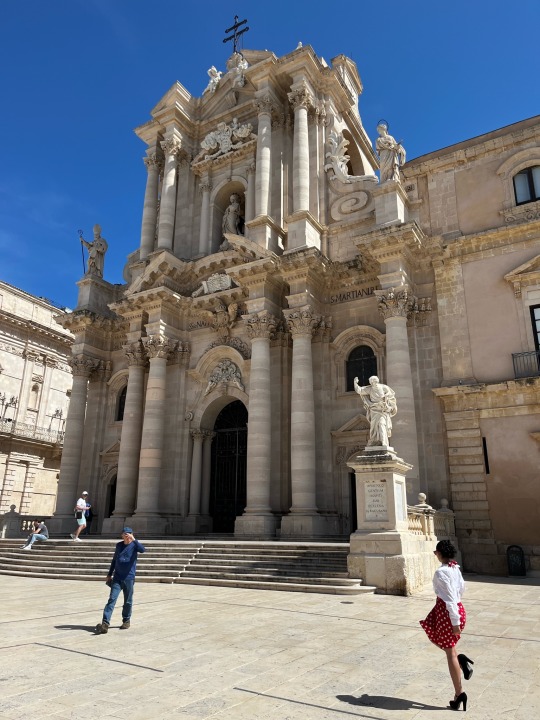
The Cathedral, which is now my favorite site in all of Italy and about which I will write a separate post.
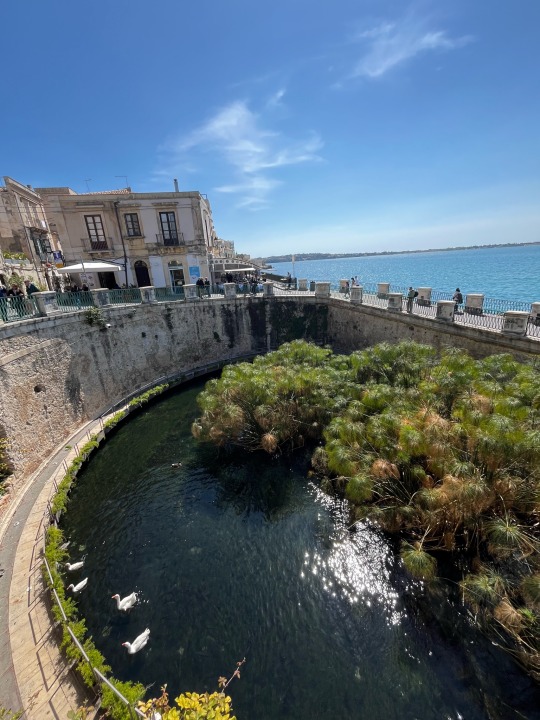
The Fountain of Aretusa, which is really interesting. It is a natural, fresh water spring, right beside the salty Mediterranean.
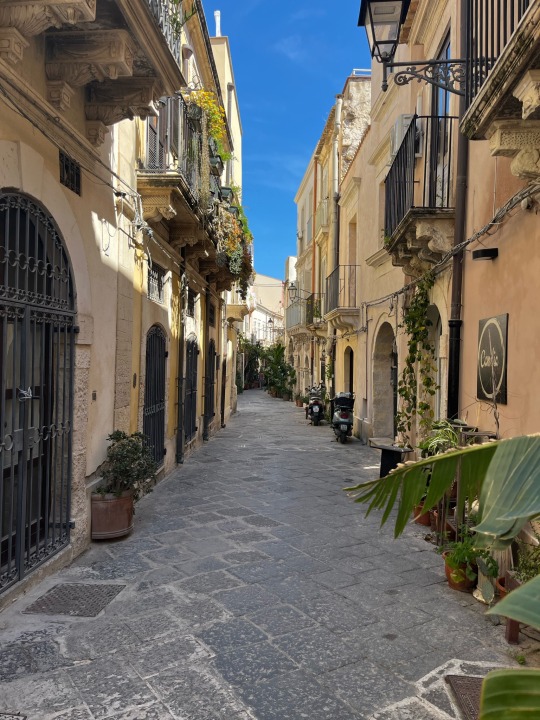
One of many cute streets.
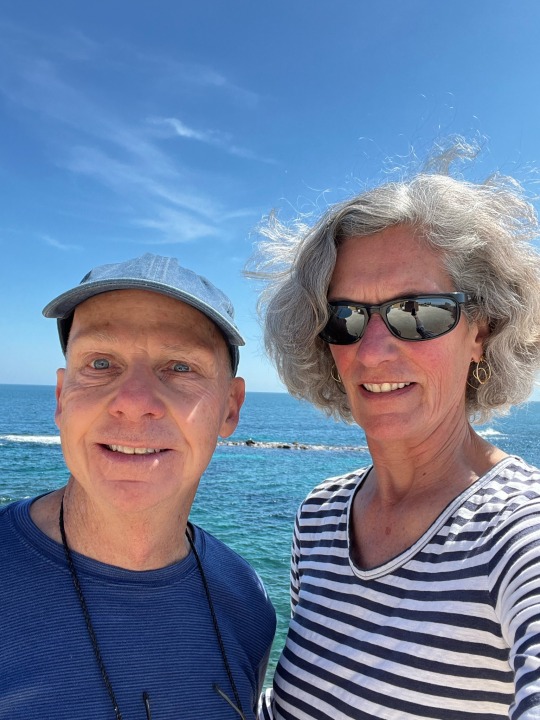
The waterfront.
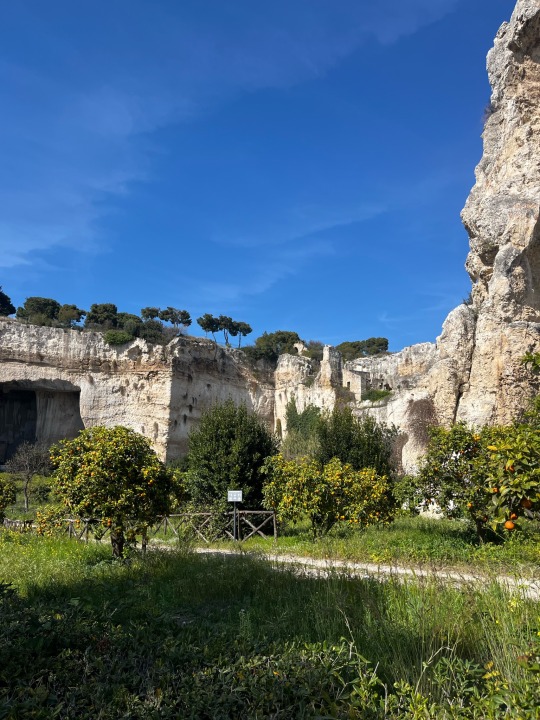
Now the archeological park. These are the latomie, or stone quarries. Huge building blocks were cut out of these cliffs. The center is now a citrus grove but was an ancient prison…prisoners were the workforce. Access to this local stone was Siracusa’s superpower!
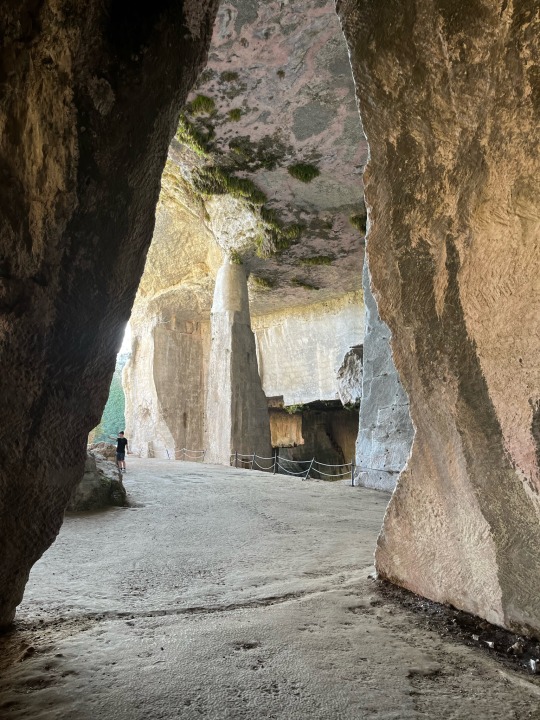
As the stones were removed, huge caves were created. In today’s park, sculptures decorate the walkways and caves. This colossus….
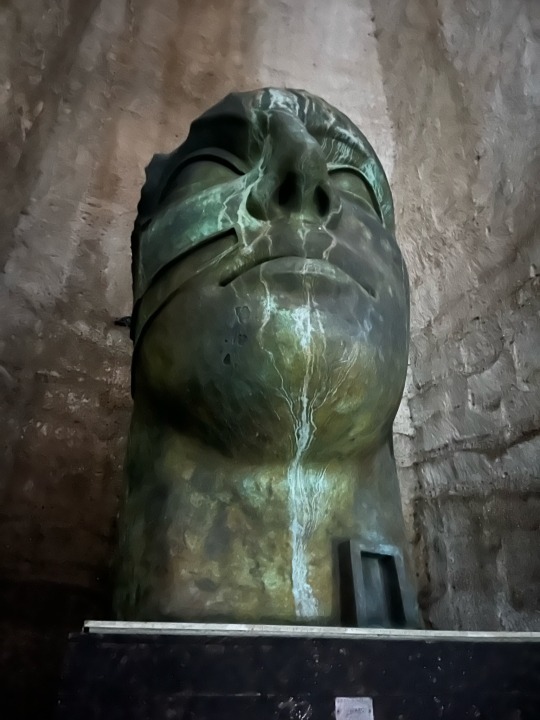
…was in the deepest cave in total darkness. Everyone had their phone flashlights lit! But my phone had no trouble capturing the image in the dark. iPhones are amazing…and so was the colossus!

The Greek theatre is still used today. It has survived because the seats were cut out of the cliff so could not be carried away and reused.
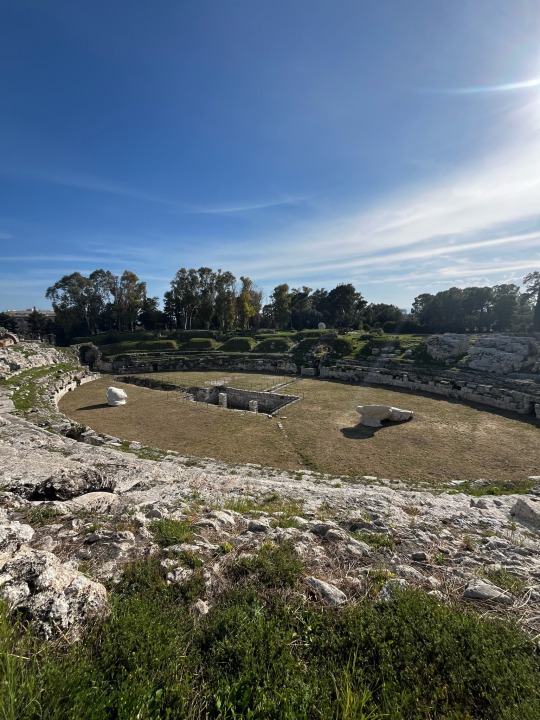
The Roman Amphitheater is less well preserved but still worth a visit. The contests against wild animals ended but the theatre continued to be used for other games until about 400AD
3 notes
·
View notes
Photo

"Alpheus and Arethusa" by René-Antoine Houasse (painted in 1689 for Louis 14's Versailles).
The myth of Alpheus (or Alpheios as he should be called) and Arethusa is a minor love story/transformation story of Greek mythology, which has two different versions.
In the first version (the Greek version, told by Pausanias), Alpheus was a hunter who fell in love with Arethusa, a huntress. But she fled from his love - she went to the far-away island of Ortygia, and there turned into a well (or fountain). But Alpheus' love was so great that in turn he turned into a river, and its waters flowed underground just to join those of Ortygia from the mainland: thus the river Alpheios flows into the well of Arethusa.
In the second version, much more well-known (and of Roman origin, told by Ovid) Alpheus was a river-god, and Arethusa a nymph : he appeared to her in human form when she took her bath in his waters, and he told her his love. But Arethusa, afraid, fled away from the lustful god who hunted her down so that she would become his lover. Arethusa in despair called upon Diana (Roman Artemis) the virgin goddess and protectress of the nymphs. Artemis took pity on Arethusa and hid her from Alpheus' view with a thick cloud. She then took her to her holy island of Ortygia, and there turned her into a sacred spring. But Alpheus' love never ceased, and so he took back his river-shape and he had his water flow underground, so as to cross the sea, and reappear on the island of Ortygia, to mix his own flow in Arethusa's.
Overall the story itself is not part of a great mythology or religious cycle (through Ovid used it in his “Metamorphosis” to illustrate the transformations of legends. The Greeks knew and brought up this story only to explain the geographical bizareness they had noticed - how the river Alpheios flew underground from the mainland to reappear on the island of Ortygia. It is one of those “geographical myths” explaining landmarks of the Greek country.
As you can see, Houasse painted the Roman version of the myth - more precisely the moment where Diana rescues Arethusa from Alpheios with a cloud.
15 notes
·
View notes
Text
Ortygia, Syracuse / my summer holidays on film
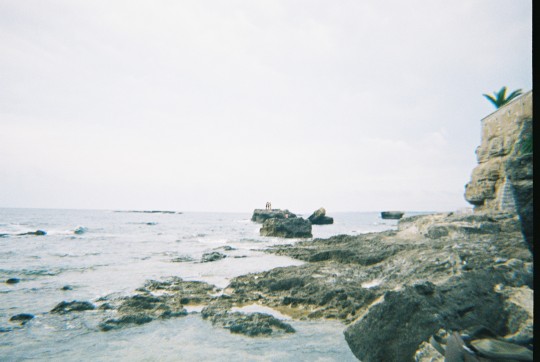
8 notes
·
View notes
